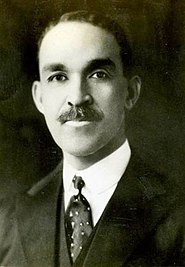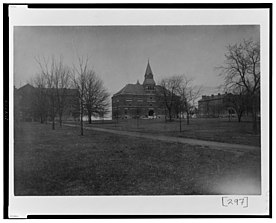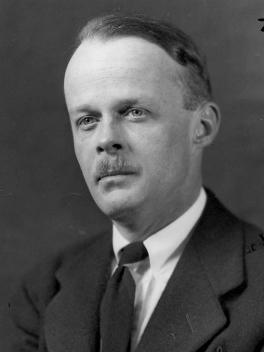
John Orley Allen Tate, known professionally as Allen Tate, was an American poet, essayist, social commentator, and poet laureate from 1943 to 1944.

Morehouse College is a private historically Black men's liberal arts college in Atlanta, Georgia. Anchored by its main campus of 61 acres (25 ha) near Downtown Atlanta, the college has a variety of residential dorms and academic buildings east of Ashview Heights. Along with Spelman College, Clark Atlanta University, and the Morehouse School of Medicine, the college is a member of the Atlanta University Center consortium. Founded by William Jefferson White in 1867 in response to the liberation of enslaved African-Americans following the American Civil War, Morehouse stressed religious instruction in the Baptist tradition. Growth in the mid-20th century led to strengthened finances, increased enrollment, and more academic competitiveness. The college has played a key role in the development of the civil rights movement and racial equality in the United States.

Sir Walter Alexander Raleigh was an English scholar, poet, and author. Raleigh was also a Cambridge Apostle.

Shaw University is a private Baptist historically black university in Raleigh, North Carolina. It is affiliated with the American Baptist Churches USA. Founded on December 1, 1865, Shaw University is the oldest HBCU to begin offering courses in the Southern United States. The school had its origin in the formation of a theological class of freedmen in the Guion Hotel. The following year it moved to a large wooden building, at the corner of Blount and Cabarrus Streets in Raleigh, where it continued as the Raleigh Institute until 1870. In 1870, the school moved to its current location on the former property of Confederate General Barringer and changed its name to the Shaw Collegiate Institute, in honor of Elijah Shaw. In 1875, the school was officially chartered with the State of North Carolina as Shaw University.

Benjamin Elijah Mays was an American Baptist minister and American rights leader who is credited with laying the intellectual foundations of the American civil rights movement. Mays taught and mentored many influential activists, including Martin Luther King Jr, Julian Bond, Maynard Jackson, and Donn Clendenon, among others. His rhetoric and intellectual pursuits focused on Black self-determination. Mays' commitment to social justice through nonviolence and civil resistance were cultivated from his youth through the lessons imbibed from his parents and eldest sister. The peak of his public influence coincided with his nearly three-decade tenure as the sixth president of Morehouse College, a historically black institution of higher learning, in Atlanta, Georgia.
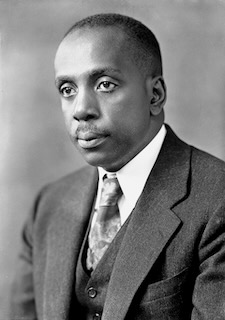
Howard Washington Thurman was an American author, philosopher, theologian, mystic, educator, and civil rights leader. As a prominent religious figure, he played a leading role in many social justice movements and organizations of the twentieth century. Thurman's theology of radical nonviolence influenced and shaped a generation of civil rights activists, and he was a key mentor to leaders within the civil rights movement, including Martin Luther King Jr.

The Interdenominational Theological Center (ITC) is a consortium of five predominantly African-American denominational Christian seminaries in Atlanta, Georgia, operating together as a professional graduate school of theology. It is the largest free-standing African-American theological school in the United States.

Benjamin Jefferson Davis Jr., was an African-American lawyer and communist who was elected in 1943 to the New York City Council, representing Harlem. He faced increasing opposition from outside Harlem after the end of World War II. In 1949 he was among a number of communist leaders prosecuted for violating the Smith Act. He was convicted and sentenced to five years in prison.
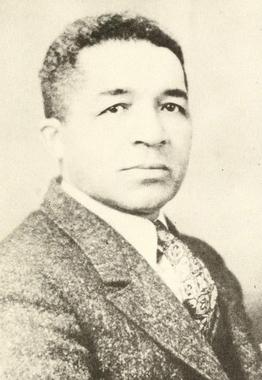
Benjamin Franklin Hubert served as president of Georgia State Industrial College for Colored Youth continuing when it became Georgia State College]] from 1926 until 1947. It is now Savannah State University.

Albery Allson Whitman (May 30, 1851 – June 29, 1901 was an African-American poet, minister and orator. Born into slavery, Whitman became a writer. During his lifetime he was acclaimed as the "Poet Laureate of the Negro Race". He worked as a manual laborer, school teacher, financial agent, fundraiser and pastor. He died in Atlanta in 1901 of pneumonia.

Jacob Javan Durham, was an American minister, educator, debater and orator, and the founder of a college. He was a Baptist minister in South Carolina, and the founder of Morris College in 1908. He was a member of the board at Morehouse College and an officer in state and national Baptist conventions.

Edward McKnight Brawley was an American educator and minister in North Carolina and South Carolina. He was the first African American to attend Bucknell University. He was an important figure in the development of the African-American church in South Carolina and the American southeast and helped found numerous churches and schools, including the Benedict Institute and Morris College. He served as president at Morris and, earlier, at Selma University. Later in his career he was a professor at Shaw University. He was also a prominent pastor at numerous churches and an important figure in civil rights and religious affairs.

Silas Xavier Floyd was an African-American educator, preacher, and journalist. Active in Augusta, Georgia, he was a writer and editor at the Augusta Sentinel and later wrote for the Augusta Chronicle. In 1892 he co-founded the Negro Press Association of Georgia. He was pastor at Augusta's Tabernacle Baptist Church and was a prominent agent of the International Sunday School Convention. He was also a public school principal and an officer of the National Association of Teachers in Colored Schools.

Ednorah Nahar (1873-1936) was an African American elocutionist from Boston who flourished between the late 1880s and early 1900s giving dramatic recitations throughout the United States, as well as abroad.
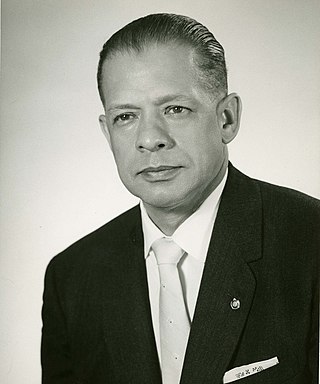
John Hervey Wheeler was an American bank president, businessman, civil rights leader, and educator based in North Carolina. Throughout his life, Wheeler was recognized for his accomplishments by various institutions across the country. John H. Wheeler started as a bank teller at Mechanics and Farmers Bank, and worked his way up to become the bank's president in 1952. In the 1960s, Wheeler became increasingly active in United States politics, carrying several White House positions appointed by Presidents John F. Kennedy, Richard Nixon, and Lyndon B. Johnson.

Sadie Gray Mays was an African-American social worker, trained at the University of Chicago. As the wife of Benjamin Mays, she was also a prominent Baptist minister's wife, a college president's wife, and a civil rights activist.

John Warren Davis was an American educator, college administrator, and civil rights leader. He was the fifth and longest-serving president of West Virginia State University in Institute, West Virginia, a position he held from 1919 to 1953. Born in Milledgeville, Georgia, Davis relocated to Atlanta in 1903 to attend high school at Atlanta Baptist College. He worked his way through high school and college at Morehouse and graduated with a Bachelor of Arts degree in 1911. At Morehouse, Davis formed associations with John Hope, Mordecai Wyatt Johnson, Samuel Archer, Benjamin Griffith Brawley, Booker T. Washington, and W. E. B. Du Bois. He completed graduate studies in chemistry and physics at the University of Chicago from 1911 to 1913 and served on the faculty of Morehouse as the registrar and as a professor in chemistry and physics. While in Atlanta, Davis helped to found one of the city's first chapters of the National Association for the Advancement of Colored People (NAACP).

Anita Patti Brown was an American concert singer. She was sometimes billed as "the Bronze Tetrazzini".
Georgia Baptist College was a private grade school and college in Macon, Georgia, United States. It was founded in 1899 as Central City College and was renamed in 1938. It closed due to financial difficulties in 1956.
